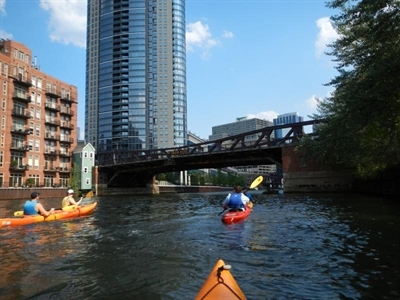Holy Mackerel! You may have seen the recent news story—an invasive Asian carp has been found just a few miles from Lake Michigan. The live carp was pulled out of the Calumet River. This fish got well beyond the electric barriers put in place several years ago to keep this invasive species from entering the Great Lakes. With this discovery it’s an opportune time to catch you up on what’s been happening with regard to efforts to keep harmful invasive fish out of our Great Lakes.
During 2010–2014 my colleague, Josh Ellis, wrote a series of blog articles about the control of migration of Asian carp and other invasive species between the Illinois River (which is part of the Upper Mississippi River Basin) and the Great Lakes. The heading for these articles was Separation Anxiety, an apt title since one of the options being discussed was building a dam or wall to structurally separate the Chicago River Waterway System from the Illinois River. This, of course, would be a turnaround from the engineering achievements of early 1900’s which were designed and constructed to connect these waters.
As Josh reported in the last of his seven articles, the U.S. Army Corps of Engineers released a report in 2014 discussing cost assessments, risk thresholds and timelines for possible options to control the spread of aquatic nuisance species (including, but not limited to, Asian carp). So far there have been no major capital projects accomplished to prevent the inter-Basin migration of fish species, but the State, working with a number of key partners, has been carrying out operational measures to track and remove Asian carp in the Upper Illinois River and the Chicago Area Waterway System in order to prevent these flying fish from journeying toward the Great Lakes. The operations include contract fishing to reduce the populations of Silver and Bighead carp in the upper Illinois and lower Des Plaines rivers. The operational measures and the electric barriers have generally been effective—in 2015 and 2016 no carp were observed upstream of the Brandon Road Lock and Dam near Joliet.
The action plan also provides for extensive monitoring to detect the presence and movement of invasive species. That is, in fact, how the Asian carp in the Calumet River was recently discovered. The fish, a Silver carp weighing 8 pounds and measuring 28 inches, was found by a monitoring team about nine miles from Lake Michigan. This is an early alert, highlighting that the existing efforts, while critically important, are not sufficient to prevent the migration of invasive species that would wreak havoc on the Great Lakes ecosystem.
A promising idea to prevent migration of carp is to integrate controls into the Brandon Road Lock and Dam system. Building controls into the lock system, versus constructing a fixed barrier there or at another location, has the advantage of allowing for continued use of the waterway system for shipping and recreational boating. (With a full barrier, barges would not be able to pass, and would need to unload and then reload cargo onto another barge or a train or trucks.) The Corps of Engineers recently completed a report preliminarily recommending what could be done at the Brandon Road Lock and Dam. The Corps’ intention has been to widely circulate the report for review, and to then modify the plan as appropriate taking into account feedback from stakeholders and the public. However, the release of the report has been held back by the new Administration.
MPC is of the view that the report should be released now, to allow for what the Corps has envisioned—a robust review with input and suggestions from a broad range of interests. If there are refinements that are warranted to the project components preliminarily recommended, there will be plenty of time to make those changes. Illinois Senators Durbin and Duckworth and several Great Lakes Congressional Representatives, led by Congresswoman Debbie Dingell (Michigan) and including Mike Quigley (Illinois’s 5th District), are advocating for the release of the Brandon Road study. The Alliance for the Great Lakes is organizing a grassroots effort to have concerned citizens communicate to the White House about this critical matter.

If Asian carp were to invade the Chicago River, they'd disrupt development and activities along the riverfront, like kayaking. Flickr user Gabe D.
In the meantime, MPC has undertaken a project to help inform future decision making about measures that could be implemented to limit the inter-basin migration of aquatic invasive species. With funding from the Joyce Foundation, we are presently working on an evaluation of the economic benefits or consequences of carrying out control projects. For example, what jobs would be created to construct and operate the control systems? Would there be effects, good or bad, related to flooding in the region? What would be the effects on riverfront development and commercial activity and tourism if Asian carp were to get into the Chicago River and the harbor areas? We are hoping to provide information that will help the Corps, the State and other leaders make sound decisions that will be beneficial for the ecosystem and the economy.
Chicago’s economy is heavily dependent on Lake Michigan and the Chicago River. Can you imagine people trying to kayak near the Riverwalk with 40-pound Asian carp jumping out of the water nearby? We need to construe the discovery of the carp near Lake Michigan as the disquieting wake-up call that it is, and reinvigorate efforts to plan appropriate control measures to prevent the migration of harmful invasive species.